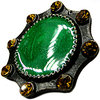Ancient Germanic Concho, 25 x 25 mm, Antique brass plated, 2 rivet pins
The Teutons or Teutones were a Germanic tribe mentioned by Greek and Roman authors, notably Strabo and Marcus Velleius Paterculus. According to Ptolemy's map, they originally lived in Jutland, which is in agreement with Pomponius Mela, who placed them in Scandinavia (Codanonia). In the late 2nd century BCE, under their leader Teutobod, along with the Cimbri, the Teutons migrated from their original homes in southern Scandinavia and on the Jutland peninsula of Denmark and invaded the Roman Republic. Though they won a spectacular victory at the Battle of Arausio in 105 BCE, the Teutons were eventually defeated later that year at the Battle of Aquae Sextiae. Some of the surviving captives are reported to have been among the rebelling Gladiators in the Third Servile War. Prior to 100 BCE, many of the Teutons, as well as the Cimbri, migrated south and west to the Danube valley, where they encountered the expanding Roman Republic. During the late 2nd century BCE, the Teutons and Cimbri were recorded as passing west through Gaul and attacking Roman Italy. After decisive victories over the Romans at Noreia and Arausio, the Cimbri and Teutons divided forces and then were defeated separately by Gaius Marius in 102 BCE and 101 BCE respectively, ending the Cimbrian War. The Teutons' defeat was at the Battle of Aquae Sextiae (near present-day Aix-en-Provence). Some of the surviving captives were reported to have been among the rebelling Gladiators in the Third Servile War. The racial affinities of the Teutons is a matter of dispute amongst historians. Their name is Celtic in form, and many writers suppose that the Teutons were really Celts, a branch of the Helvetii. But a people of this name seems to have been mentioned by the early traveller Pytheas as inhabiting the coasts of the northern ocean in his time. Strabo and Marcus Velleius Paterculus, moreover, classify them as Germanic peoples, and this is perhaps the more probable view, although apparently the distinction between Celts and Teutons was not clearly realized by some of the earlier historians. If the Teutons really came from the same quarter as the Cimbri, it is possible that their name may have been preserved in that of the district called until recently Thyland or Thythsyssel in the extreme north-west of Jutland.













